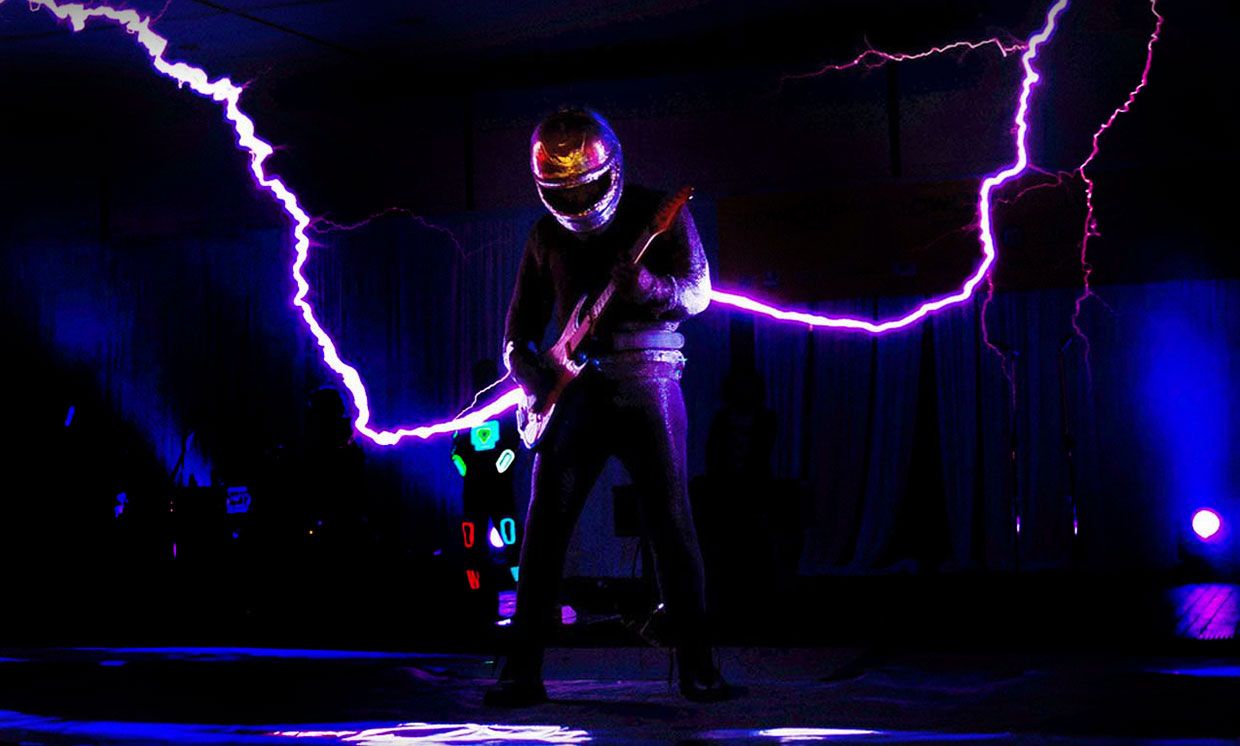9 New Suggestions For Bored Engineers

Like many of you, IEEE Spectrum's staff is still working from home. As the weeks have turned into months, we've had to find ways to occupy our minds and hands. A few weeks ago, we looked through Spectrum's archives to find 19 things you can do with minimal space and resources. Now here's a new selection of ideas to keep cabin fever at bay:
Kits Photo: Stephen Cass
Photo: Stephen Cass Here are two kits that you can get online, and which only require a soldering iron and a tiny amount of free space (I built both of these in the patch where my laptop normally lives!)
Get Ahead of the Curve: I'll admit that a streak of gallows humor prompted me to order the MightyOhm Geiger Counter kit. What else might 2020 have in store for us? But actually, I find its occasional clicking comforting in the current crisis-however crazy the world seems, physics continues serenely on... MightyOhm's counter is also very friendly for anyone who might want to integrate it into a larger project or automate data collection: it can send out individual signal pulses via a header, or you can connect an FTDI serial cable and transmit counts per second in a text format to a host computer. While the detector is not intended for any kind of critical use, I found it sensitive enough to detect the residue of radiation from a sample of Trinitite I bought a few years ago. The kit is currently on sale, complete with a very spiffy acrylic case, for US $75.
Get Your Vacuum Tube On: Unless you speak German, you'll need to put Google Translate on your smartphone for this one, but it's worth the effort. Franzis makes a shortwave radio kit that uses a single tube, and it's a nice way to dip a toe into the world of retro-electronics. The tube is used in the radio's receiver stage, and an integrated circuit takes care of the amplification. The cardboard box that the kit comes in doubles as a surprisingly sturdy case, with a little cutout that shows off the gently glowing tube. As mentioned above, the instruction booklet is in German, but Google Translate's camera view option had little difficulty in transforming the pages into English. A good antenna and ground connection are important to actually picking up anything, but I hooked the radio up to my 20-meter ham stick dipole antenna at night, and was immediately able to find a couple of stations. Franzis doesn't seem to have an official U.S. distributor, but I got the kit on eBay for $50, where it's still available as of this posting.
 Photo: ArcAttack
Photo: ArcAttack Museums and live events are shifting online as social distancing makes having a physical audience impossible. Here's two suggestions for putting a little technological spectacle into your week.
Thunderbolts and Lightning: We profiled Joe DiPrima of ArcAttack last year-he and his brother make custom giant Tesla coils, and during performances they use the coils to emit lightning bolts modulated with musical tones. Starting this weekend, they'll be hosting live shows from their home base every Sunday at 3PM, Texas time. People who watch live on Facebook will even be able to make music requests.
Fun for All the Family: Ars Electronica started in 1979 as a festival for Art, Technology and Society." Since 1996, they've had a year-round physical presence, and just last year opened a new center in Linz, Austria. With the center currently closed to the public, they've launched Ars Electronic Home Delivery. On weekdays, they offer a YouTube livestream with events throughout the day, including live concerts and tours of the center and its exhibits, including special tours for children. Check their calendar for details-all times are for Austria, but events are archived for later viewing.
Take a break, play some games, and check out the story of Silicon Valley's most influential failure:
Play Commodore 64 Games the Way They Were Meant to Be: Modern emulators of classic home computers like the Commodore 64 allow games to be loaded in the blink of an eye. But this means skipping past what was an integral part of the original experience for most users: loading in the games from a cassette tape drive, which took several minutes. Game designers often tried to make the wait more interesting by displaying custom artwork, music, and even minigames during the process. Now the Ultimate Tape Archive Team has added a huge collection of tape games, with scans of the inserts that went into cassettes, and a free online emulator that lets you play the games right in your browser-complete with the original tape loading process! (Don't worry, a suggestion that the loading process randomly fail to 100 percent replicate the original experience was rejected!)
Too Fast, Too Soon: On stage, a charismatic CEO wears dark clothes. He paces back and forth as he describes his company's development of a wireless device that will become a ubiquitous part of people's lives, a treasured technology that will let them do everything from send messages to book flights using just a touchscreen. No, it's not Steve Jobs announcing the iPhone in 2007, but Marc Porat revealing General Magic's Magic Cap mobile operating system in 1993. Founded in 1990 as a spin off from Apple, General Magic was the greatest Silicon Valley company that failed. A documentary freshly available on streaming services tells its tale, drawing heavily on contemporary footage filmed in the 1990s alongside extensive retrospective interviews with many of the key employees. These include famed Macintosh software designer Andy Hertzfeld, as well as Tony Fadell, who would go on to play a critical role in the creation of the iPod and iPhone. The company left an indelible mark on Silicon Valley, and I suspect its cautionary tale is in no small part responsible for today's ethos of launching a minimal viable product," rather than trying for perfection right from the get go.
Perfect for weekends, here are some projects that don't even need a soldering iron, but which offer satisfying results:
Fight COVID With a Pi: Raspberry Pi computers are so cheap, I doubt I'm the only one who has accumulated a small collection lying dormant in drawers or old projects. Now you can put those machines to good use with the Rosetta@home project. The project aims to model the 3-D structure of complex proteins by parceling the work out to volunteers running Rosetta software on their computers. In April, the client software was updated to run on the ARM-Linux hardware and software stack compatible with the Raspberry Pi, and the project is now looking for proteins that will bind to the SARS-CoV-2 virus responsible for COVID-19.
Flex Your Software Muscles: If playing classic games using the Commodore 64 emulator mentioned above has piqued your interest in classic machines, try programming one. The BBCMicrobot, which we covered in Spectrum a few weeks ago, scans for Tweets that mention its name, and then injects the result into an emulator of the BBC Microcomputer, an ancestor of the ARM chip that runs most smartphones. The bot then makes a little movie of the output and tweets the results back. Several prominent coders have written amazing programs that have fitted within the character limit confines of a single tweet-what can you do?
Get Ready to Go On the Air: Somewhat in that spirit of What else might 2020 have in store?," a good way to up your disaster preparedness is to get a handheld ham radio-and get your license. Although license exams have been suspended for now due to pandemic restrictions, that doesn't mean you can't begin studying. In the United States, a technician license-the lowest level and easiest to get-is all you need to use a handheld UHF/VHF radio. (These used to cost over $100, but you can get radios now for less than $30.) Several folks at Spectrum have studied for their license with one of Dan Romanchik's, No-Nonsense Study Guides, free at the technician level, which makes learning what you need to pass a snap. Guides for higher level licenses are also available for a fee.